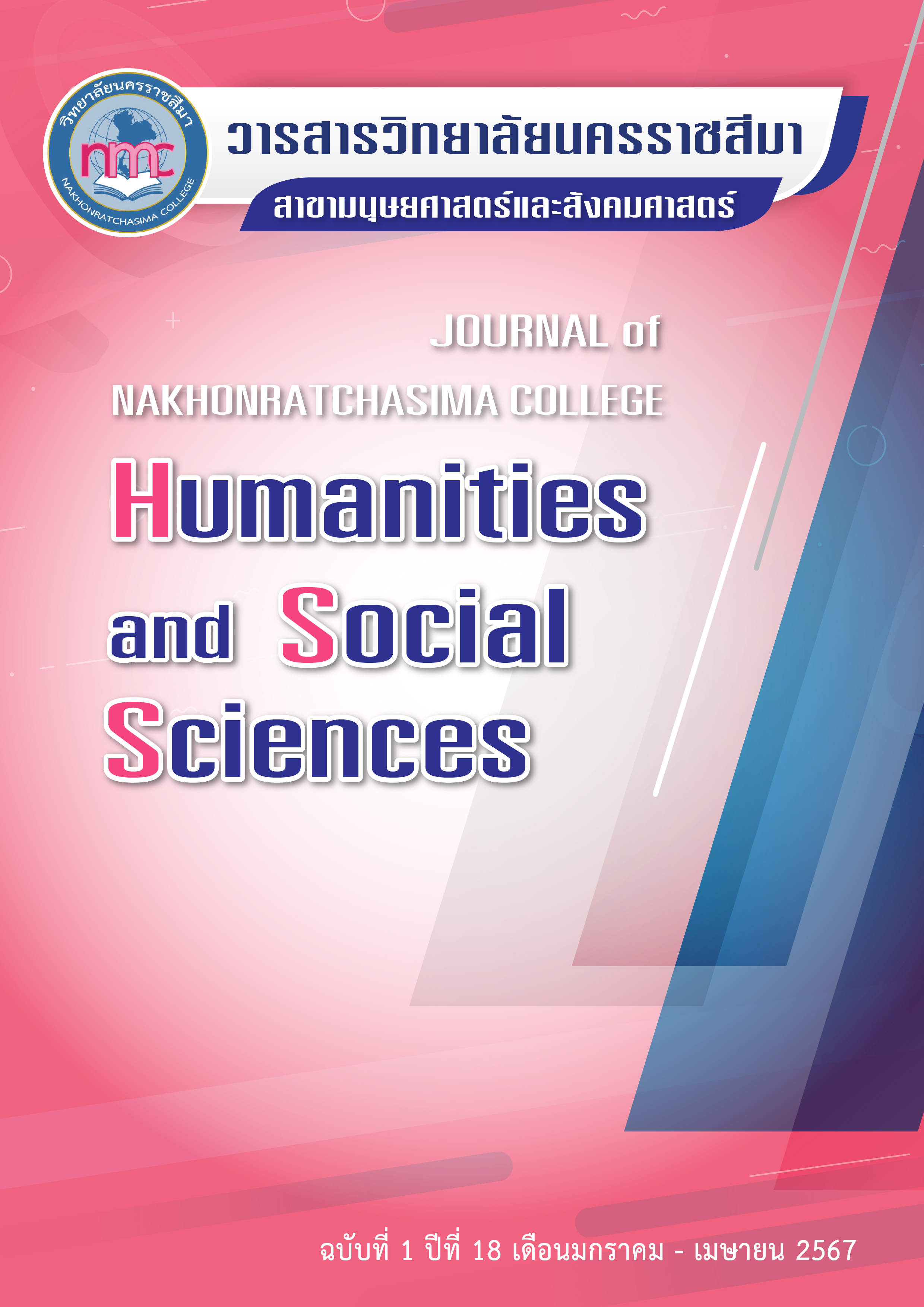Relationship between perceived social support and university students’ academic engagement in Shanxi, China: the chain mediating effect of academic buoyancy and academic emotion, the moderating effect of proactive personality
คำสำคัญ:
Perceived social support, Academic buoyancy, Academic emotion, Proactive personality, Academic engagementบทคัดย่อ
This study takes perceived social support as independent variable, academic buoyancy and academic emotion as mediator variables, and proactive personality as moderator variable, academic engagement as dependent variable. Based on the quantitative data of 445 and qualitative data of 20 university students in Shanxi Province, China, the method of questionnaire survey to analyze the relationship of variables and verify the research hypothesis and theoretical conceptual framework.
The research results show that: (1) Perceived social support has positive predictive effect on academic engagement; (2) Perceived social support has positive predictive effect on academic buoyancy; (3) Academic buoyancy has positive predictive effect on academic engagement; (4) Perceived social support has positive predictive effect on academic emotion; (5) Academic emotion has positive predictive effect on academic engagement; (6) Academic buoyancy and academic emotion have chain mediating effect between perceived social support and academic engagement; (7) Proactive personality has moderating effect between perceived social support and academic engagement; (8) Proactive personality has no moderating effect between academic emotion and academic engagement. Finally, some recommendations are made.
เอกสารอ้างอิง
Af Ursin, P., Järvinen, T., Pihlaja, P. (2021). The role of academic buoyancy and social support in mediating associations between academic stress and school engagement in Finnish primary school children. Scandinavian Journal of Educational Research, 65(4), 1-15.
Cheng L.N. (2016). The impact of family socioeconomic status on learning engagement: Understanding the mediating role of social support. Educational Science Abstracts.
Fang L.T., Shi K., Zhang F.H. (2008). A Study on the reliability and validity of the Chinese Version of the academic engagement Scale. Chinese Journal of Clinical Psychology, 16 (6):618-620.
Kuh,G.D. (2009).The national survey of student engagement: Conceptual and empirical foundations. New Directions for Institutional Research,(141),5-20.
Lei J.H. (2022). Research on the status quo and relationship of middle school students 'active personality, academic buoyancy, father's psychological control and academic input. Guangxi University for Nationalities. Nanning.
Li Y.Y. (2022). Review on learning engagement and its influencing factors. Western Quality Education, 8(5), 3.
Lian L. (2022).The relationship among junior high school students' perception of social support, academic buoyancy and school engagement. Yunnan Normal University, Kunming.
Liang Y. (2020). Understanding the relationship between social support and the subjective well-being of junior middle school students: the intermediary role of self-affirmation and the sense of self-worth. Henan University,Zhengzhou.
Pekrun R.,Goetz T.,Frenzel,A.C.,Barchfeld,P.,& Perry,R.P. (2011).Mesuring emotions in students’ learning and performance:The Achievement Emotions Questionnaire (AEQ). Contemporary Educational Psychology,36(1):36-48.
Pekrun R.,Goetz T.,Titz W.,et al. (2002).Academic emotions in students’ self-regulated learning and achievement:A program of quantitative and qualitative research. Educational Psychologist, 37(2):91-105.
Pitzer, J., & Skinner, E. (2017). Predictors of changes in students’ motivational resilience over the school year: The roles of teacher support, self-appraisals, and emotional reactivity. International Journal of Behavioral Development, 41(1), 15-29.
Schaufeli,W.B.,Martinez,I.M.,Pinto,A.M.,Salanova,M.,&Bakker,A.B.(2002). Burnout and engagement in university students: A cross-national study. Journal of cross-cultural psychology, 33(5),464-481.
Shang J.Y., Gan Y.Q. (2009). Effect of proactive personality on self-efficacy in career decision-making among college graduates. North Journal of Beijing University: Natural Science Edition,45 (3):548-554.
Song C.R., Chen M., Li W.Q., Li L.H., Li Y.Y. (2020). Understanding the impact of social support on depression in college students: the chain mediating role of social avoidance and distress and core self-evaluation. Psychological Technology and Application,(07), 423-430.
Sun W.W. (2009). The impact of daily academic resilience and academic investment on academic performance. Northeast Normal University, Changchun.
Xu X.C. & Gong S.Y. (2009). Academic mood and its influencing factors. Progress in psychological science, 17 (1), 92-97.
Yang Z., Zhang J.W., Tan Y. & Liu L.S. (2022). The effect of mobile phone dependence on college students' learning engagement: the chain mediating role of social support and delayed gratification. Journal of Southwest University: Natural Science Edition, 44(2), 7.
Yin H.B.,Shi L.,Yang L. (2020).The Empirical Research into College Students’ Learning and Development in China(2015-2019):Themes, Methods and Commentary.Journal of East China Normal University (Education Science Edition),(9),179-199.
Zhou Y.F., Zhang J.W., Zhang C.Y., Li H.H., Yu Y. (2020). The role of proactive personality on innovation behavior of R&D personnel Theory-Based on the integrated perspective of trait activation and resource conservation theory. Soft Science,(7),33-37.
Zimet,G.D.,Dahlem,N.W.,Zimet, S. G., & Farley, G. K. (1988). The multidimensional scale of perceived social support. Journal of personality assessment, 52(1), 30-41.
ดาวน์โหลด
เผยแพร่แล้ว
รูปแบบการอ้างอิง
ฉบับ
ประเภทบทความ
สัญญาอนุญาต
จรรยาบรรณผู้เขียนบทความ
ผู้เขียนบทความต้องรับรองว่าบทความนี้ไม่เคยตีพิมพ์ในวารสารใดหรือสิ่งพิมพ์อื่นๆ มาก่อน ต้องไม่คัดลอกผลงานผู้อื่นมาปรับแต่งเป็นบทความของตน และไม่ได้อยู่ระหว่างการเสนอเพื่อพิจารณาตีพิมพ์ อีกทั้งยอมรับหลักเกณฑ์การพิจารณาและการตรวจแก้ไขบทความต้นฉบับโดยกองบรรณาธิการวารสารวิทยาลัยนครราชสีมา สาขามนุษยศาสตร์และสังคมศาสตร์
บทความทุกเรื่องได้รับการตรวจพิจารณาทางวิชาการโดยผู้ทรงคุณวุฒิที่มีประสบการณ์และมีความเชี่ยวชาญตรงตามสาขาของบทความ ซึ่งผู้เขียนต้องแก้ไขตามคำแนะนำของผู้ทรงคุณวุฒิภายในระยะเวลาที่กำหนด หากไม่เป็นไปตามกำหนดกองบรรณาธิการขอสงวนสิทธิ์และยกเลิกการตีพิมพ์โดยจะแจ้งให้ทราบต่อไป
ข้อความที่ปรากฏในบทความของวารสารนี้เป็นความคิดเห็นของผู้เขียนซึ่งไม่เกี่ยวข้องกับวิทยาลัยนครราชสีมาแต่อย่างใด และกองบรรณาธิการขอสงวนสิทธิ์ในการพิจารณาและตรวจประเมินบทความเพื่อตีพิมพ์ในวารสารของวิทยาลัยนครราชสีมา สาขามนุษยศาสตร์และสังคมศาสตร์



